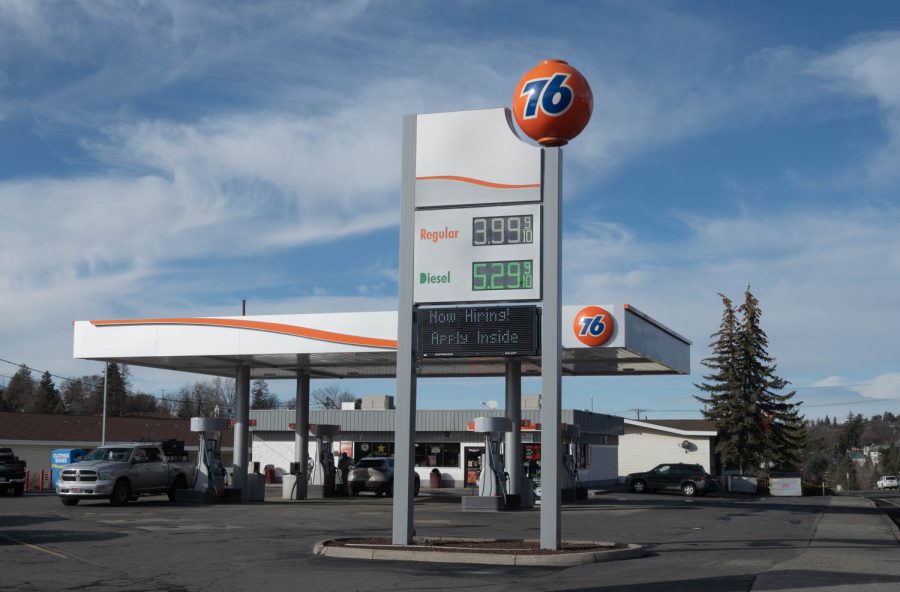Washington gas prices on a downward trend; students react
Explaining the economics behind gas prices and their impact on WSU students.
76 gas station prices in Pullman. Saturday, Jan. 14, 2023.
January 16, 2023
Gas prices have begun decreasing over the past several months and it has had a significant impact on many students at WSU. Since October 2022, gas prices in Washington have decreased by over $1, according to Global Petrol Prices.
WSU Economics professor Dr. Raymond Batina explained that gas prices are directly related to the supply and demand of oil.
“Gas prices respond to supply and demand. An increase in demand for driving causes [the] price to rise, while a decrease in demand causes [the] price to fall. So gas prices increase in the summer and during the holidays when people are driving more and decrease after the holidays are over and when the summer winds down,” Batina said.
Specifically, gas prices also fluctuate by location and in general, state prices are vastly different from one another. Gas prices tend to be lower in states like Texas where there are a lot of refiners (refiners are production facilities converting heavy fuel into marketable fuel), and are higher in states like Washington or Hawaii that are not close to any refiners, Batina said.
Despite the U.S. being a large country with large productions of oil and gas, they remain a small part of the oil market globally. Rather than the U.S. having a direct influence on the worldwide price of oil or the price of gas, he said.
“International factors like the war in Ukraine or the cut to sales of Russian oil in Europe can also have a large impact on prices in the US. For example, prices rose dramatically in 2022 because of the post-pandemic increase in driving, the slow response in increasing oil refining capacity in the US, and the energy uncertainty caused by the war in Ukraine, a major factor is causing the price to rise,” Batina said.
The price of gas has directly impacted several students’ decisions on whether or not to bring their own car to school. One student who shared that sentiment is junior nursing major Emily Smith, who said that it was the reason she did not bring a car last semester.
“With the lower prices, it definitely helped with the decision to bring a car. It makes it much easier to get groceries and be able to do more things that I want to, but the prices of gas made me second guess that decision all of last semester,” Smith said.
She said she also shares her car with her roommate, something that she said makes gas much cheaper as they split the bill every time they fill up the car.
For senior computer science major Brandon Johnson, gas prices are still too high for her to consider bringing his car with him to Pullman.
“Although getting to class and getting groceries can sometimes be unreliable with the bus systems, the gas prices are still pretty high and I don’t really want to be spending the money to pay for gas right now,” he said.
Johnson said that he is certainly glad that gas prices are down. They would need to decrease well below $4 before he said he would realistically consider bringing a car.
Sophomore kinesiology major Emalee Place said that gas prices were the reason that she does not currently have her car with her.
The current prices on their downward trend have made it harder to justify leaving her car back home, especially since she lives in slightly off-campus apartments, she said.
“I live just far enough away from campus where it does not make sense to walk to classes every day, but I would much rather have my own transportation than to rely upon and use the bus systems,” Place said.
A desire to carpool and a change in how he uses his car were what senior microbiology major Parker Smith said was impacted by the price of gas.
“Higher prices of gas encourage me to find more ways to carpool. Otherwise, I only drive for myself when I need to get groceries and whatnot. Back in Wenatchee, gas is cheaper, so I could drive around more for fun and go to more places to hang out. In Pullman, I cannot justify driving around to explore because of even the current prices in gas,” Smith said.










